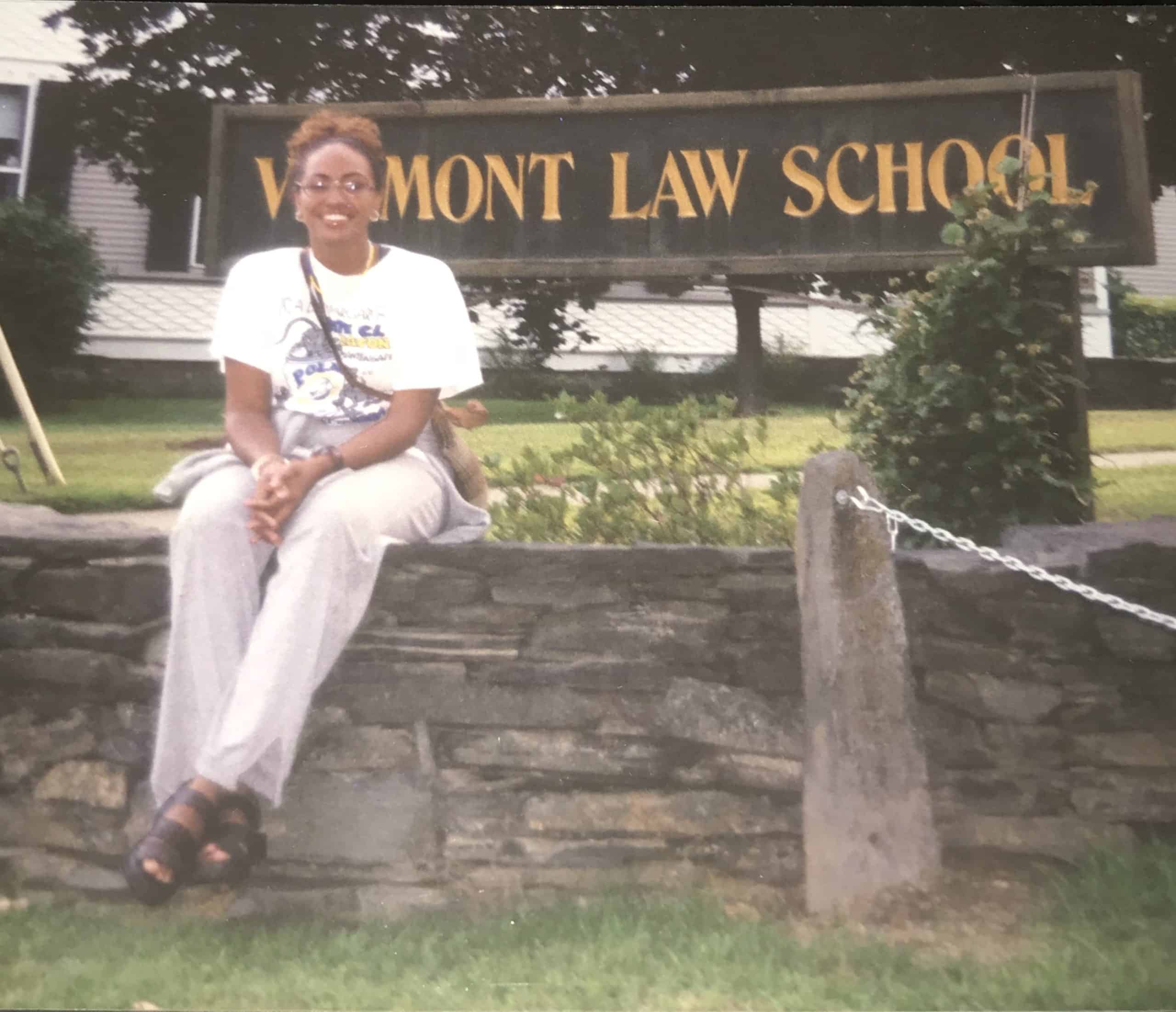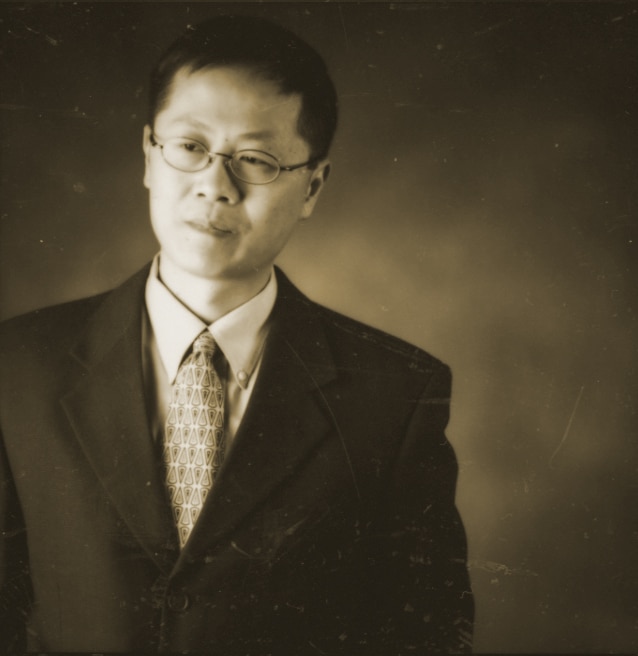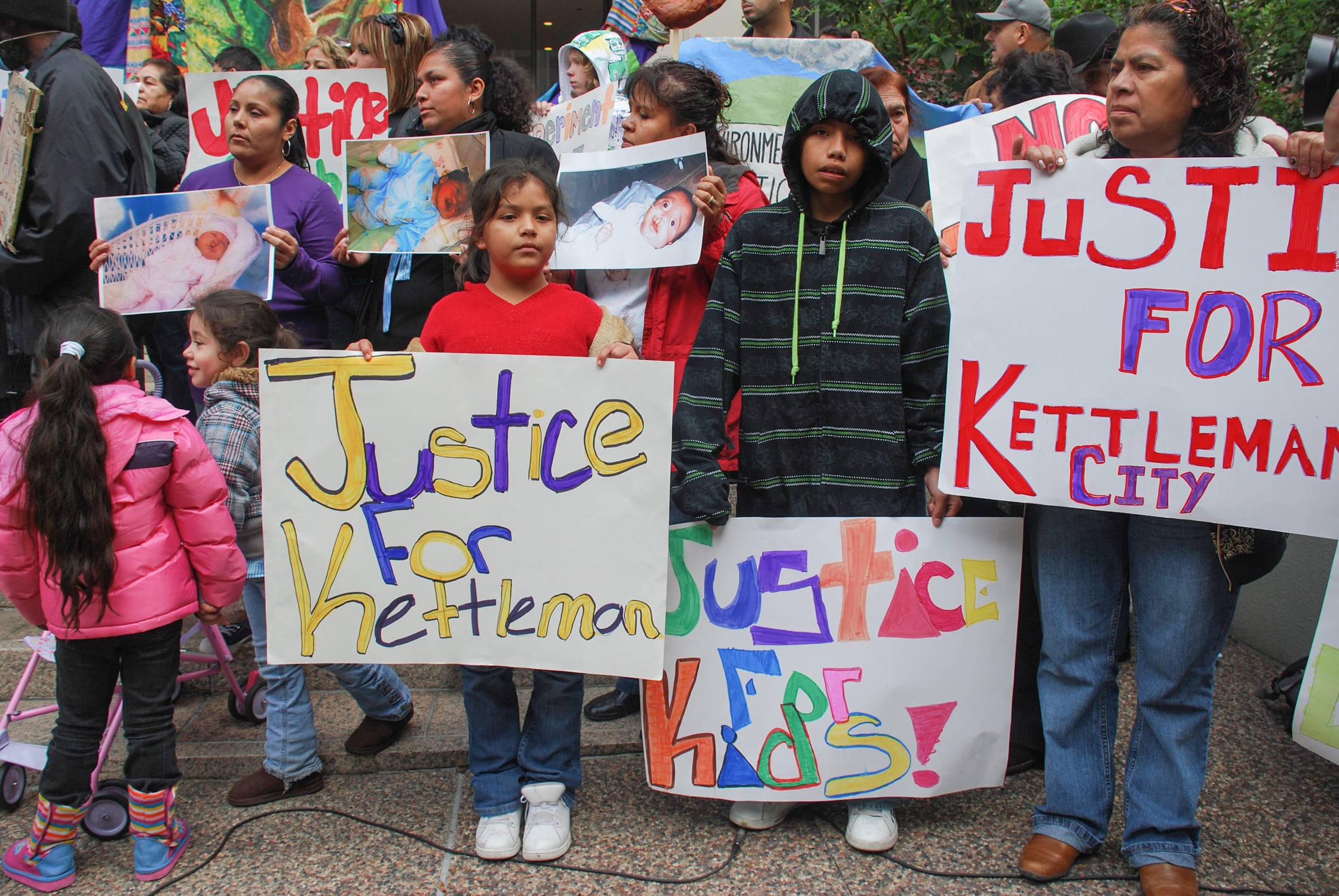December 4, 2018
Loquitur // Winter 2019
HELENA WOODEN-AGUILAR JD’02 Is Committed to the Pursuit of Environmental Justice.
Helena Wooden-Aguilar JD’02 was in her second year as an attorney in the U.S. Environmental Protection Agency’s (EPA) Office of Civil Rights when she got an unusual call at her desk.
It was a simple case that Wooden-Aguilar had fielded by-the-book. The woman’s complaint had been filed under Title VI of the Civil Rights Act of 1964, alleging that an EPA-funded agency had given the greenlight to a facility that would diminish air quality in her community. Unfortunately, the alleged conduct had happened too far in the past according to the U.S. Code of Federal Regulations, so Wooden-Aguilar was compelled to reject it. It is rare for individual complainants to reach out directly to the EPA officials assigned to their case, however, and, during the call, Wooden-Aguilar soon realized the complainant had no understanding of federal timeliness requirements. So when Wooden-Aguilar hung up, she went back to her supervisor and asked that the case be reopened under an exception to the code.
When the complainant found out, she called Wooden-Aguilar again. This time she was crying with gratitude.
“It blew my mind,” Wooden-Aguilar says of the calls, which took place more than a decade ago. In a regulatory bureaucracy the size of the EPA’s, she added, people are normally just “names on paper.”
In the end, Wooden-Aguilar found no evidence of discrimination in that particular case. But that doesn’t mean justice wasn’t done.
“It was just as important [for the woman] to have been heard, to have been provided information. In that moment, I realized that my role was not just to be a trier of facts, but also to be an advocate for justice. It’s not just about the facts. It’s about the people.”
Wooden-Aguilar
For Wooden-Aguilar, that simple case provided an important lesson. It’s one that she has continued to carry with her throughout her career at the EPA, which has included managerial roles in the Office of Civil Rights, where she began her tenure in 2004 and later helped head up the handling of Title VI cases, and her current position as acting deputy chief of staff for the entire agency.
“Obviously, a measure of success is complaints go down, or complainants are happy, or recipients [of federal funding, who are the targets of Title VI complaints] are happy,” she says. “I’ve never seen my job as making people happy. For me, the integrity of the process and the integrity of the people that are in charge of the process is how I measure success.”
The Roots of a Life Pursuing Justice
A Pennsylvania native and graduate of Howard University, Wooden-Aguilar grew up with an appreciation for social justice and government service. Her mother, an immigrant from Venezuela, worked for the state. Her father, an African-American who worked in higher education, had been active in the civil rights movement in the U.S., including when he was a student at Howard.

Helena Wooden-Aguilar during orientation for first-year students at CLS in 1999.
Wooden-Aguilar double majored in sociology and anthropology as an undergraduate, imagining she would become a “female Indiana Jones.” But a class on environmental justice taught by a government attorney during her junior year opened her eyes to the law. She found Vermont Law School through Google searches for “environmental law,” “social justice,” and “best law school.” On a visit with her mom, during which she sat in on classes and spoke with faculty and students, she fell in love with the location and the program.
“I felt a strong connection—a really good vibe,” she says. Jamaal Buchanan JD’02, a friend and former classmate, remembers meeting Wooden-Aguilar during orientation.
“You get a sense of who are the intelligent people, who are the people who are going to work hard,” he says. “From the very beginning, Helena stood out. She knew she wanted to go into environmental law, while some of us were like, ‘I don’t know what I want to do.’” A class with Tseming Yang, now a professor at Santa Clara University School of Law, reinforced Wooden-Aguilar’s career aspirations and introduced her to the Civil Rights Act and, specifically, to Title VI. That was when she decided she wanted to work for the EPA.
“You’re telling me there’s an actual statute we can enforce to provide relief to communities,” she remembers thinking. “It opened my mind to the fact that I could work for the federal government and put these pieces together and do some good.”

Professor Tseming Yang
“You could tell that Helena was really grappling with how society has treated the poor and racial minorities unfairly but at the same time in the context of an environmental regulatory system that’s quite complex.
Yang, who later worked with Wooden-Aguilar at the EPA, says she was a “really thoughtful student, deeply interested in the issues.”
“You could tell that Helena was really grappling with how society has treated the poor and racial minorities unfairly but at the same time in the context of an environmental regulatory system that’s quite complex,” he says. “That’s what I found to be most remarkable about Helena: she takes these issues seriously from both sides.
Coming Face to Face with Title VI Cases at the EPA
After graduation, Wooden-Aguilar returned home to Pennsylvania to work at a nonprofit focused on domestic violence prevention. Even though the work wasn’t environmental in nature, it was solution-oriented, which appealed to her approach to justice. One of the issues she worked most closely on was housing: domestic violence survivors are often adversely affected by rental policies that prohibit police activity, even when the police activity is through no fault of their own.
“That work instilled in me the themes of fairness and equality,” she remembers. “I took a keen interest in that.” When she saw an open position to work on Title VI cases in the EPA’s Office of Civil Rights, however, she jumped at it. “It felt like a miracle,” she says. “It seemed like a dream job to me.”
Perhaps, but for the EPA, Title VI was something of a nightmare. The statute, which prohibits discrimination against members of the public by recipients of government funds, is controversial as applied by the EPA for a variety of reasons. First, it puts the EPA in a position of policing the state and local agencies that are normally its partners in environmental protection. When an individual or advocacy group claims that a local regulator has made a decision that unfairly impacts a community, the EPA must investigate and decide whether to take action against that regulator. That makes the cases politically unpopular.
More controversial is the EPA’s record on Title VI matters. In 2011, a few years after Wooden-Aguilar arrived in the Office of Civil Rights, the office published a self-commissioned report that found the agency had “not adequately adjudicated Title VI complaints” and was facing a backlog of cases dating back more than a decade. Later reports criticized the office’s almost nonexistent findings in favor of complainants over the years.
Part of Wooden-Aguilar’s job was to try to improve the internal process for Title VI cases. To that end, she held so-called “listening sessions” with stakeholders within and outside the agency and formalized the use of alternative-dispute resolution (ADR) by making it available to the parties in all Title VI cases. In 2015, shortly before she left the Office of Civil Rights for her current position, Wooden-Aguilar authored a report documenting the office’s progress, including inserting language about Title VI in all its agreements with EPA funding recipients; meeting regularly with stakeholders to monitor compliance; and providing technical assistance, among other efforts.
“She was definitely one of the people within the Office of Civil Rights really trying to push these issues forward,” says Yang, who supervised the work of his former student in his role as EPA’s deputy general counsel.
William Yon, who worked under Wooden-Aguilar as a clerk while he was at The George Washington University Law School, says his former boss is “a relentlessly positive person.”
“It’s hard to discourage her,” he says. “She’ll have a mission in mind and be willing to do the work to get there. When there are problems, she sort of rolls with it and tries to keep everything moving.” Wooden-Aguilar is particularly proud of implementing ADR in Title VI cases, which had been known to drag on for years without resolution.
“The possibility of a community sitting across a table from an adversary and coming to solutions without the federal government having to play trier of fact is amazing to me,” she says.
Pioneering the Use of ADR in a Landmark Case
In 2013, Wooden-Aguilar introduced ADR into a long-running Title VI case in California. The original complaint brought by the community advocacy group Greenaction for Health & Environmental Justice against the San Joaquin Valley Air Pollution Control District alleged a lack of meaningful public involvement in approving construction of a fossil fuel power plant in Avenal. The case was ultimately resolved with ADR—a first under the Obama administration—and led to public notices in both English and Spanish, a major win for the predominantly Spanish-speaking and Latino community. Three years later, the Avenal case was a helpful precedent in a settlement described as “historic” by Greenaction and two local regulators who were battling it out over allegations related to a hazardous waste site.
“Avenal set the tone for [Kettleman] to even happen,” Wooden-Aguilar says. Bradley Angel, the executive director of Greenaction, which also brought the Kettleman City case, says mediation in the Avenal case was “strategically important” to its resolution, in combination with community organizing and public advocacy.
“We were able to win some important victories around civil rights compliance and language access through mediation,” he says. But he adds that the EPA’s “miserable” record on Title VI cases means local agencies don’t have much to fear if they can’t come to an agreement with complainants.

For the past 10 years, the community advocacy group Greenaction for Health & Environmental Justice has worked with the predominantly Spanish-speaking and Latino community of Kettleman City, California, to address pollution issues.
“What we really need is government agencies to actually comply with civil rights laws and enforce civil rights laws,” he says.
Wooden-Aguilar doesn’t disagree: For the right results, the right processes need to be in place and people need to be able to meaningfully participate in those processes. To help ensure that a more diverse cohort of future lawyers is trained in environmental justice, law, and policy, she helped broker an agreement between her employer and her law school alma mater that allows students from minority academic institutions to study in Vermont Law School’s top-ranked environmental education program and to intern at the EPA. At least 25 students from North Carolina Central University School of Law took advantage of the program in its first iteration, which began in 2010; in January 2017, the EPA and Vermont Law School signed a memorandum of understanding to renew the collaboration.
The partnership, which Wooden-Aguilar spearheaded, was inspired by her first unsuccessful attempt to reach the EPA. When she was a student at VLS, Wooden-Aguilar applied for an internship at the agency but was rejected because of a lack of experience in environmental law and policy. She doesn’t want that to happen to others.
“If we want to change the conversation of environmentalism, we need to have diversity of thought,” she says. “How do you do that? You bring students from all walks of life and you enrich them at the EPA.”
Kevin C. Foy, who helped facilitate the partnership at North Carolina Central and, as a result of it, now teaches in VLS’s summer program, says the impact on students who participated was obvious.
“What I saw from my students when they came back was just a lot more awareness,” he says. “They sort of became ambassadors for environmental issues. That was its most profound effect.”
Former EPA official Ben Scaggs, who helped Wooden-Aguilar launch the partnership within the agency, says Wooden-Aguilar’s commitment to environmental justice is what got the program up and running in the first place, and what makes it so special now.
“None of that would have happened without Helena. Fundamentally, Helena is a people’s person—that drives or fuels her to do all the work that she does. At the heart of it all is a desire that everybody be heard and treated fairly.”
Ben Scaggs, former EPA official.
Wooden-Aguilar’s current role at the EPA is more internal-facing (as acting deputy chief, she has a hand in personnel decisions and employer-employee relations); she isn’t likely to pick up the phone and hear a Title VI complainant on the other end of the line. But through the partnership with VLS and her responsibilities at the EPA, she still feels like she can help people have a voice in the environmental justice movement, including by empowering others to pursue jobs in the field.
“I believe I’m in a position to help open doors and create opportunities,” she says.
This past summer, an intern who worked with Wooden-Aguilar at the EPA sent her a thank you note to say her experience there had made her rethink her future career. For Wooden-Aguilar, that’s progress—helping someone see how they can be part of the process. “My job is to inspire future leaders to be at the table of this environmental conversation with the most diverse lens they can have.”
Rebecca Beyer is a freelance writer living in New York City.